Baby Fussy or Crying While Breastfeeding – Causes and Solutions

Breast milk is one of the best sources of nutrition for babies. Breastfeeding not only provides nourishment to your baby, but it is also one of the best ways to bond with your little one. This pleasant and comforting experience may become a nightmare when you see your baby crying while breastfeeding or after nursing sessions. Addressing any issues requires patience and observation. Remember, while it may be challenging at times, the bond formed during breastfeeding is invaluable for both you and your baby’s overall well-being. In this article, we’ll tell you the causes of babies crying while nursing and also give you some solutions.
Causes of Crying During Breastfeeding
All these factors can make your baby fuss during feeding:
1. The Flow of Breast Milk
Many babies cry while breastfeeding due to the flow of milk. If your baby coughs or gags after you begin breastfeeding, you may be having an over-reactive let-down. On the other hand, if immediately after you begin feeding, your baby pulls off, arches his back and kneads against your breast, this means you have a slower let-down. You may try breast compression to ease the flow.
2. Your Baby Needs to Pass Wind
If your baby is crying while nursing, it may also signal their urge to burp or pass gas. While shifting your baby from one breast to the other, gently rub his back. However, once your baby is six months or older, he may burp on his own. You can even change his nappy to expel the trapped gas.
3. He Feels Distracted
Babies who are three months or older easily get distracted by their environment. If your curious baby hears a loud noise, your efforts to get him back to the breast may irritate him.
4. He Is Teething
Some babies cry and fuss when they’re teething. As their gums become sore, sucking causes pain and discomfort.

5. Your Baby is Stressed
If you’re worried and stressed, your baby may get stressed, too. This may lead to your newborn crying while breastfeeding.
6. Your Baby Feels Tired
Sometimes, due to inadequate sleep, babies cry or fuss while feeding. However, babies feel more settled and start sticking to a routine after three months of age.
7. He Isn’t Hungry
If your baby isn’t hungry or has had his fill, he may refuse to feed. If this is the case, don’t force your baby, and try feeding him later.
8. He Has Thrush
Some babies may suffer from oral thrush. This is a painful condition where a baby has a cottage-cheese-like material inside his mouth and experiences pain while sucking.
9. Your Baby Prefers One Breast Over the Other
There are also babies who prefer feeding on a particular breast. If they’re shifted to the less preferred breast, they may start crying. This may sometimes be due to some health problem, such as an ear infection or pain, that may lead to breast preference.
10. Your Baby Has a Tongue-Tie
Some babies are born with a tongue-tie, a condition where the lower part of the tongue is not fully detached. This condition hampers their ability to latch on to the breast properly. The shallow attachment may make their tongue slip and lose the grip on the breast. This can make babies irritable and cry during the feeding sessions.
11. Your Baby’s Nose is Blocked
If your baby’s nose is blocked due to a cold or an incorrect feeding posture, he may refuse to feed.
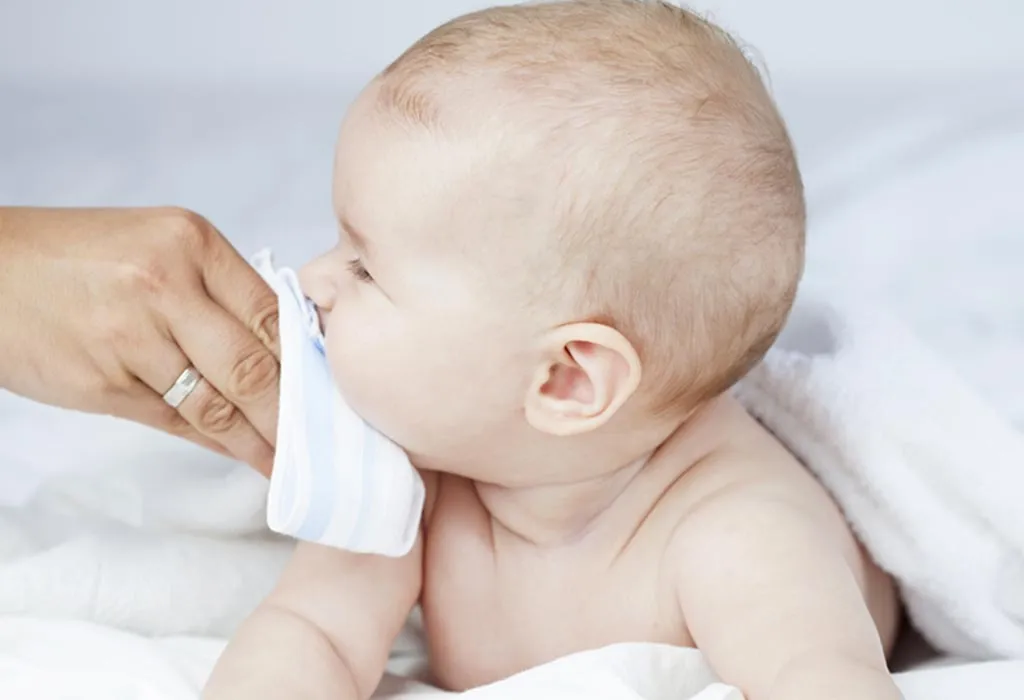
12. Your Baby is Getting Too Much Milk
Some moms have an oversupply of breast milk, which makes them overfeed their infants. Overfeeding not only makes babies gassy and unsettled but can also discourage them from feeding.
13. Your Baby Has Acid Reflux
Acid reflux is a condition wherein the food travels back up into the oesophagus from the stomach. The discomfort and pain that comes with reflux make them cry and fuss.
14. He Has Food Sensitivity
Food sensitivity is rare in exclusively breastfed infants. Nonetheless, if your baby develops food sensitivity, you may notice gas, tummy pain or discomfort. Ask your paediatrician if you need to stop consuming certain foods.
15. It May Be a Growth Spurt
When babies grow through growth spurts, they tend to become irritable and fussy. This may be the reason your baby cries during a nursing session.
16. Your Baby Smells Something Unusual
A new soap, perfume or lotion may have put your baby off from breastfeeding.
17. Your Breast Milk Tastes Different
The texture of your breast milk can change due to new foods, periods, or second pregnancy. This can trigger a breastfeeding strike.
18. Incorrect Breastfeeding Position
Baby fussy at the breast? It could be due to a poor breastfeeding position leading to discomfort for both you and your baby. Ensure a proper latch and a comfortable position to avoid any potential discomfort during feeding.
19. Nipple Confusion
If your baby is introduced to artificial nipples, such as bottle nipples or pacifiers, too early, they might experience confusion between breast and artificial nipples. This confusion can lead to frustration during breastfeeding, causing your baby to cry. Ensure a consistent approach to nipple introduction to avoid this issue.
If your baby fussy while breastfeeding, it could be either of these problems or a combination of two or more. As your infant can’t speak yet; it’s up to you to assess the symptoms and figure out the cause.
Things You Can Do to Calm Your Newborn While Nursing
Here are some things you can try to calm your baby:
1. Take Him Outdoors
Take your baby out for a stroll in the park. It’s a good idea to feed your baby after an outing.
2. Nurse Your Baby When He’s Sleepy
Feed your baby when he’s drowsy. A sleepy baby is calm and collected, making breastfeeding easier.
3. Ask Your Spouse to Carry Your Baby
Babies are good at sensing emotions. If you’re feeling stressed out or depressed, ask your spouse/grandparent to calm the baby.
4. Refrain From Giving Formula
If your baby doesn’t take to the breast, express your milk and give it in a bottle. Refrain from giving formula milk if your breast milk is sufficient for your baby.
5. Don’t Compel Him
If your baby refuses to feed, leave him be. Forcing him to drink will only make him crankier.
6. Try Nursing in a Dark Room
To prevent your baby from getting distracted by his surroundings, try feeding in a dark/dimly lit room.
7. Switch the Breast
If your baby is fussy about one breast, try offering the other one.
8. Try Different Feeding Positions
Sometimes, your baby may fuss or cry because he feels uncomfortable in a certain feeding position. Experiment with different feeding positions until you find a suitable one.
9. Squeeze Your Breasts
If your baby is upset with the slow flow of milk, squeeze or massage your breasts.
10. Burp Him
Burp the baby after a feeding session. This helps to release the trapped gas.
11. Play Soothing Music
Another way to calm and soothe your baby is to sing to him or play soft music.
12. Increase Skin-to-Skin Contact
Babies enjoy the proximity and skin-to-skin contact with their mothers. Cuddle, snuggle and hold your baby close while breastfeeding.
13. Pre-empt Your Baby’s Crankiness
If you know that your baby gets cranky at the same time every day, you may start a soothing ritual to help your baby feel comfortable and relaxed.
14. Keep Calm
If your baby fusses while feeding, keep calm and take deep breaths.
15. Use a Breastfeeding Pillow
A specially designed breastfeeding pillow can provide additional support, making the nursing process more comfortable for both you and your baby.
16. Utilize Aromatherapy
Introduce calming scents, such as lavender or chamomile, during breastfeeding. Aromatherapy can have a soothing effect on both you and your baby, contributing to a more relaxed and enjoyable nursing experience.
FAQs
1. How Can I Identify Whether My Baby Cries Due to Hunger While Breastfeeding?
If your baby exhibits hunger cues such as rooting, sucking on fingers, or making smacking sounds, it is likely they are crying due to hunger. Additionally, monitoring your baby’s feeding schedule and ensuring they are gaining weight appropriately can help confirm if hunger is the cause.
2. Can My Baby Cry Due to Overstimulation While Breastfeeding?
Yes, overstimulation can cause babies to cry during breastfeeding. If your baby seems fussy, agitated, or easily distracted during feeding, it could be a sign of overstimulation. Creating a calm and quiet environment, as well as minimizing external stimuli, can help alleviate this issue.
So, while it may be a little tedious to deal with crying babies while breastfeeding, the above tips go a long way in keeping things under control.
References/Resources:
1. Colic and breastfeeding; NHS UK; https://www.nhs.uk/start-for-life/baby/feeding-your-baby/breastfeeding/breastfeeding-challenges/colic/
2. Signs Your Child is Hungry or Full; Centers for Disease Control and Prevention; https://www.cdc.gov/nutrition/infantandtoddlernutrition/mealtime/signs-your-child-is-hungry-or-full.html
3. Newborn Crying; University of Rochester Medical Center ; https://www.urmc.rochester.edu/encyclopedia/content.aspx?contenttypeid=90&contentid=P02648
4. Why is my baby crying?; Australian Breastfeeding Association; https://www.breastfeeding.asn.au/resources/why-baby-crying
5. Jonas. W, Bisceglia. R, Meaney. M, et. al.; The role of breastfeeding in the association between maternal and infant cortisol attunement in the first postpartum year (Acta Paediatrica); Wiley Online Library; https://onlinelibrary.wiley.com/doi/10.1111/apa.14256
6. Kim. P, Feldman. R, Mayes. L, Eicher. V, et. al.; Breastfeeding, Brain Activation to Own Infant Cry, and Maternal Sensitivity (Journal of Child Psychology and Psychiatry); National Library of Medicine; https://www.ncbi.nlm.nih.gov/pmc/articles/PMC3134570/; April 2011
7. The Unhappy Breastfed baby; La Leche League GB; https://www.laleche.org.uk/unhappy-baby/
Also Read:
Baby Choking while Breastfeeding
Infants Crying After Feeding
How to Use Nipple Shield for Breastfeeding Baby?
Was This Article Helpful?
Parenting is a huge responsibility, for you as a caregiver, but also for us as a parenting content platform. We understand that and take our responsibility of creating credible content seriously. FirstCry Parenting articles are written and published only after extensive research using factually sound references to deliver quality content that is accurate, validated by experts, and completely reliable. To understand how we go about creating content that is credible, read our editorial policy here.









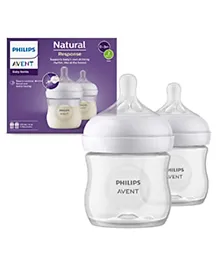




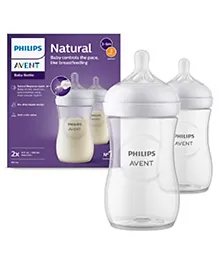
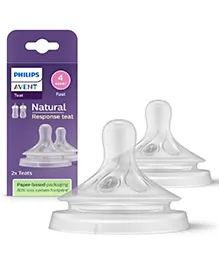
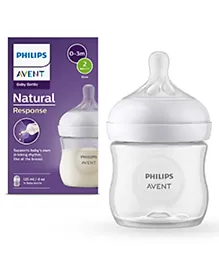








.svg)














